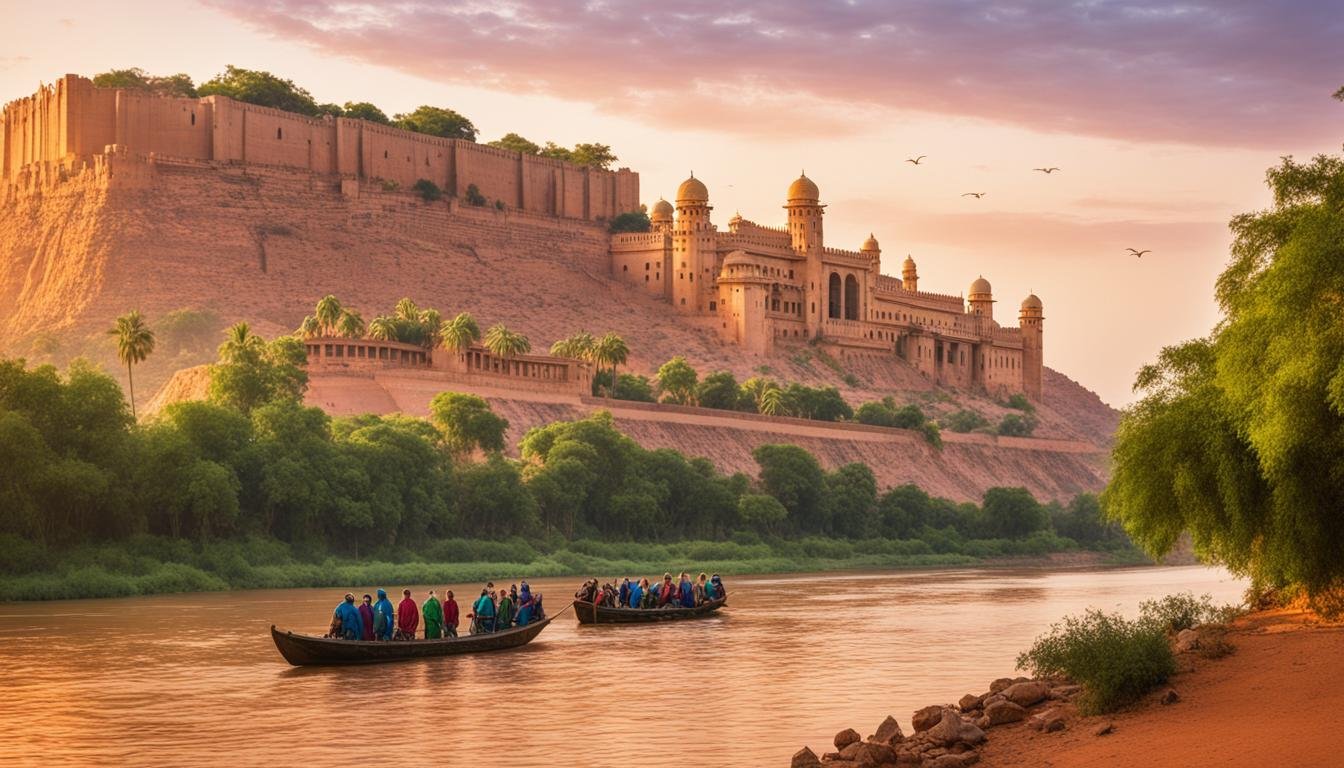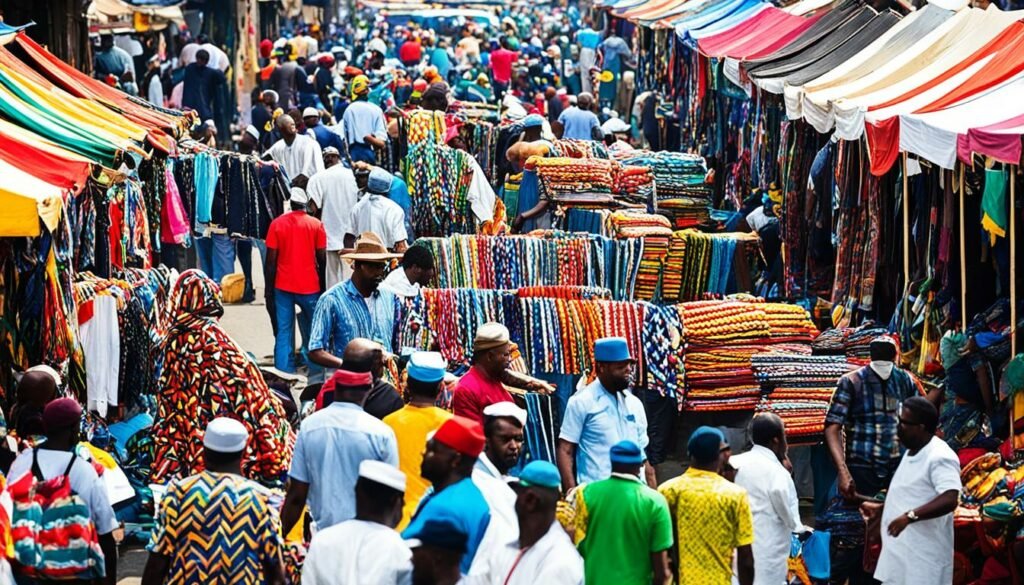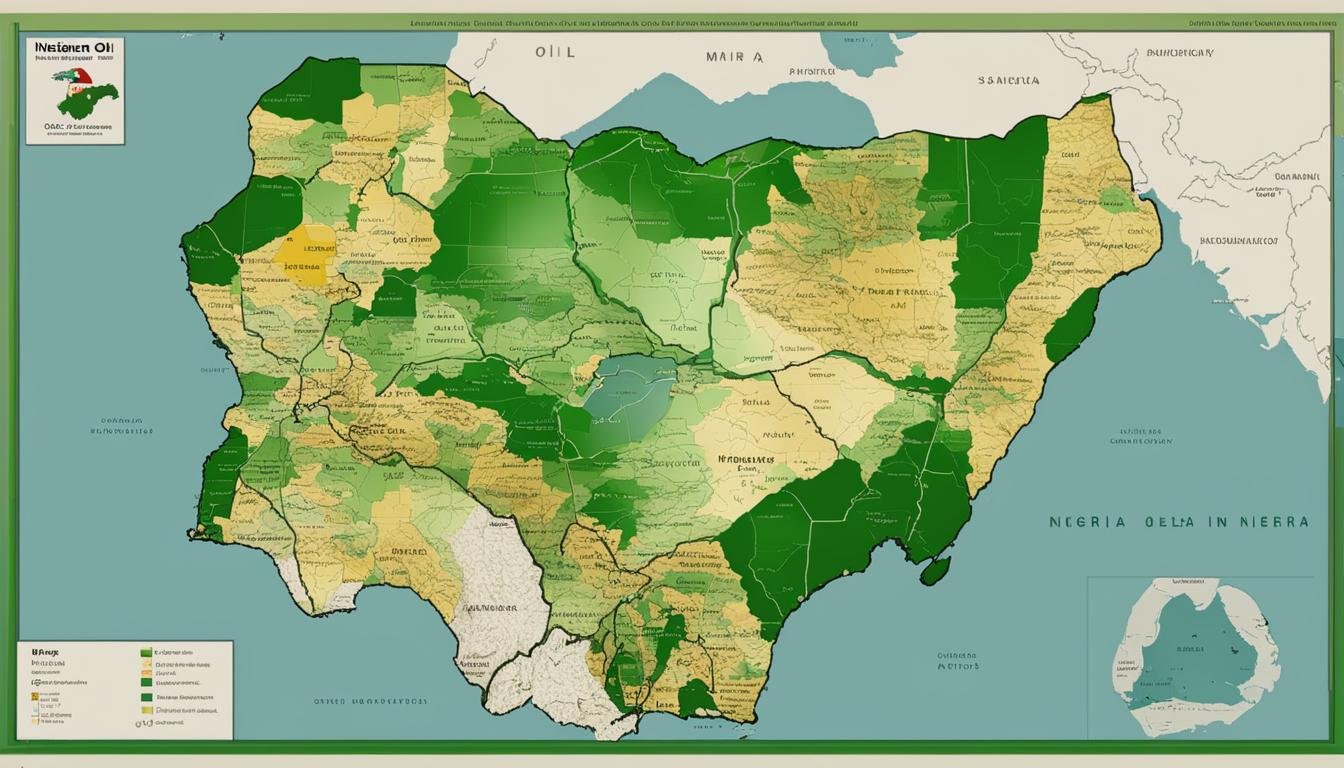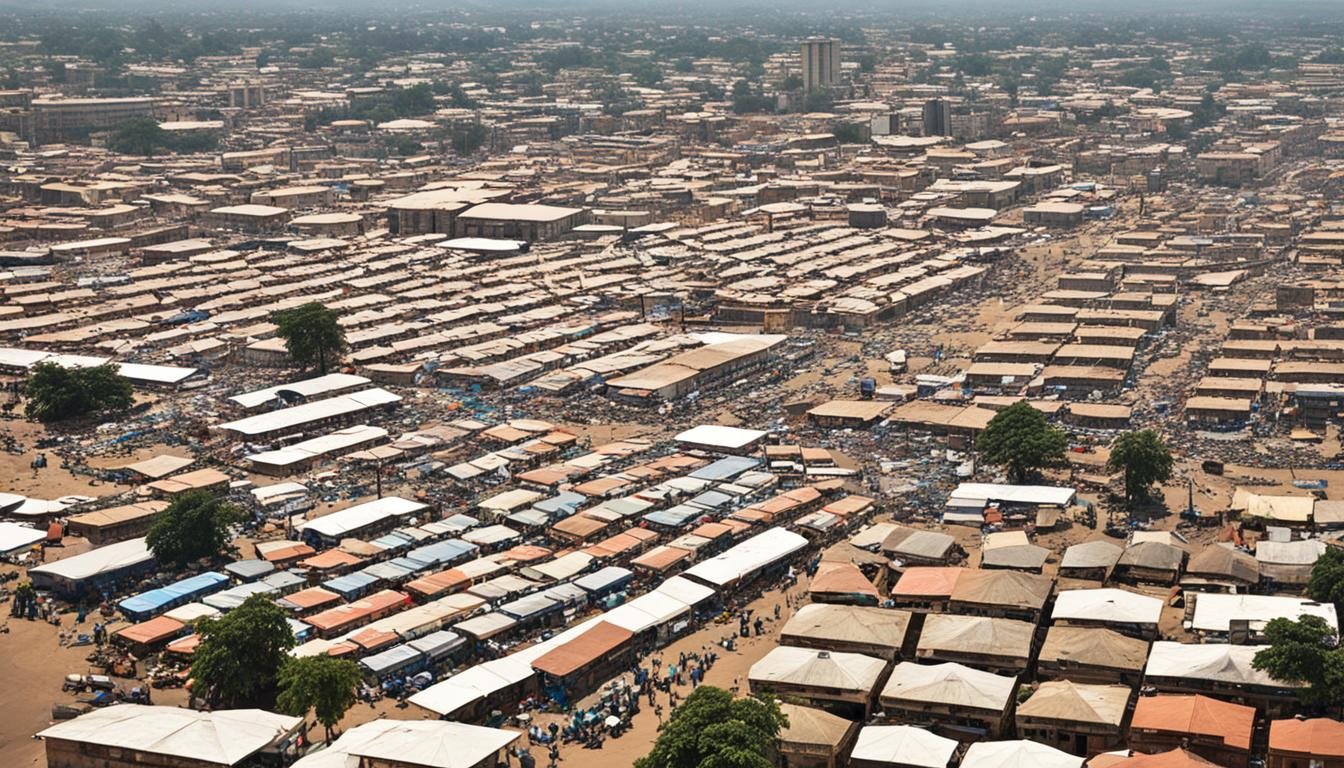Welcome to an exciting exploration of Nigeria’s captivating history! From ancient civilizations to modern-day independence, Nigeria’s past is a tapestry of fascinating stories and significant events that have shaped the nation we know today.
In this article, we will take you on a journey through Nigeria’s past, uncovering historical milestones, iconic empires, the introduction of major religions, the impact of colonialism, and the struggles for independence. We will also delve into Nigeria’s diverse cultural heritage and examine the challenges and prospects it faces in the modern age.
Join us as we embark on this enlightening exploration of Nigeria’s history and uncover the hidden gems that make this West African nation so unique and fascinating.
Key Takeaways:
- Nigeria’s history spans thousands of years and includes ancient civilizations, powerful empires, and significant historical events.
- The introduction of major religions such as Islam and Christianity has had a profound impact on Nigerian society and culture.
- Colonialism played a crucial role in shaping Nigeria’s political and social landscape, leading to struggles for independence.
- Nigeria’s cultural heritage is rich and diverse, with distinct tribes and a unique monarchy system.
- The fight for sovereignty and unity, as well as the challenges of democracy and economic reforms, continue to shape Nigeria’s path forward.
Dawn of Civilization: Prehistoric to Pre-Colonial Nigeria
In this section, we will explore the beginnings of civilization in Nigeria, from the prehistoric era to the pre-colonial period. We will delve into the fascinating history of the earliest inhabitants of Nigeria and the Nok culture, known for its extraordinary terracotta sculptures. We will also examine the rise of ancient kingdoms and empires, such as Nri, Benin, and Oyo, which left a significant impact on Nigerian history. Additionally, we will uncover the birth and importance of trans-Saharan trade routes that linked Nigeria with other parts of the African continent and beyond.
Earliest Inhabitants and the Nok Culture
The earliest inhabitants of Nigeria played a crucial role in shaping the country’s cultural heritage. Archaeological evidence suggests that human presence in Nigeria dates back thousands of years, with the Nok culture being one of the most prominent prehistoric civilizations. The Nok people were known for their exceptional craftsmanship, particularly in the production of terracotta sculptures. These intricate and expressive artworks provide insights into the daily lives, beliefs, and social structures of the Nok people.
Ancient Kingdoms and Empires: Nri, Benin, and Oyo
Nigeria’s pre-colonial history is marked by the rise and fall of powerful kingdoms and empires. Three of the most influential were the Nri Kingdom, the Benin Empire, and the Oyo Empire. The Nri Kingdom, located in present-day Anambra State, established a centralized political system and had significant religious influence. The Benin Empire, centered in present-day Edo State, flourished in the areas of art, trade, and administration. The Oyo Empire, located in present-day Oyo State, was renowned for its military prowess and expansive territorial control.
The Birth of Trans-Saharan Trade
Trans-Saharan trade played a crucial role in the development of ancient Nigeria. This network of trade routes connected Nigeria with North Africa and beyond, facilitating the exchange of goods, ideas, and cultures. The introduction of camel caravans in the 8th century CE revolutionized long-distance trade and opened up opportunities for commerce and cultural exchange. Trans-Saharan trade brought prosperity to Nigerian cities, fostering economic growth and contributing to the development of sophisticated urban centers.
| Earliest Inhabitants | Nok Culture |
|---|---|
| • Presence of human habitation dating back thousands of years | • Nok people known for their exceptional terracotta sculptures |
| • Archaeological evidence provides insights into their way of life | • Terracotta sculptures depict daily activities and societal structures |
| Ancient Kingdoms and Empires | Trans-Saharan Trade |
|---|---|
| • Nri Kingdom: centralized political system and religious influence | • Birth of trans-Saharan trade connected Nigeria with North Africa |
| • Benin Empire: renowned for art, trade, and administration | • Camel caravans revolutionized long-distance trade |
| • Oyo Empire: known for military prowess and territorial control | • Trans-Saharan trade brought economic prosperity to Nigerian cities |
The Fusion of Beliefs: Introduction of Major Religions
Religion has played a significant role in shaping the cultural and religious landscape of Nigeria. This section will explore the introduction and spread of two major religions in the country: Islam and Christianity. These religions have left a lasting impact on Nigerian society and continue to influence the lives of the people.
Islam in Ancient Nigerian Societies
The advent of Islam in Nigeria can be traced back to the ancient empires of Bornu and Hausa. As the religion spread, it brought with it new cultural and social practices that transformed traditional Nigerian societies. The teachings of Islam introduced monotheism, new forms of governance, and educational systems.
The spread of Islam in Nigeria also led to the emergence of influential Islamic centers, such as the Sokoto Caliphate. These centers became hubs of Islamic scholarship, attracting scholars from across the continent and beyond. The fusion of Islamic beliefs with Nigerian traditions resulted in the development of a unique Nigerian Islamic identity.
Today, Islam remains one of the major religions in Nigeria, with a significant population of Muslims across the country. The Islamic faith has not only shaped the spiritual lives of Nigerians but also contributed to their cultural practices, arts, and architecture.
Christianity’s Arrival and Spread
The arrival and spread of Christianity in Nigeria can be attributed to European missionaries who began their evangelistic efforts during the colonial era. These missionaries introduced Christianity to Nigerians, establishing churches and schools that played a crucial role in the spread of the faith.
Christianity quickly gained traction in Nigeria, particularly among the educated elite and coastal communities. As more Nigerians converted to Christianity, it became deeply rooted in Nigerian society, influencing both individual lives and community dynamics.
The impact of Christianity is evident in various aspects of Nigerian culture, including music, art, literature, and the education system. Today, Christianity is one of the major religions in Nigeria, with a significant number of Christians throughout the country.
| Religion | Founding Figures | Percentage of Nigerian Population |
|---|---|---|
| Islam | Prophet Muhammad and early Islamic scholars | 47.9% |
| Christianity | Jesus Christ and Christian missionaries | 48.2% |
| Indigenous Religions | N/A | 3.9% |
Colonial Imprints: The British Dominion over Nigeria
This section delves into the colonial period in Nigeria, focusing on the influence and control of the British Empire. It explores the scramble for Lagos and the formal annexation of Nigeria by the British, marking the beginning of British colonial rule in the region.
During this period of colonialism, Nigeria underwent significant changes in its economy, politics, and social structure. The British imposed their administrative systems and introduced cash crop agriculture, which had a profound impact on the country’s economy. Nigeria became a major exporter of commodities such as palm oil, cocoa, and groundnuts, all under British control.
The annexation of Nigeria by the British led to the transformation of the country into a British protectorate, with British officials governing the region and imposing their laws and regulations. The indigenous population faced cultural, political, and economic restrictions, as they were subjected to British governance.
However, the period of British rule also saw the emergence of nationalist movements and the gradual empowerment of Nigerians to fight for their independence. As the impacts of colonialism became more evident, Nigerians began to yearn for self-governance and the restoration of their cultural heritage.
The struggle for independence eventually culminated in Nigeria gaining its freedom from British rule on October 1, 1960. Nigeria’s independence marked a new era in the country’s history, as it embarked on a path of self-governance and nation-building.
The legacy of colonialism in Nigeria is complex. While it brought about modern infrastructure and institutions, it also had lasting negative effects, including the erosion of traditional systems, cultural disruption, and deep-seated economic inequalities. Today, Nigeria continues to grapple with the remnants of colonialism as it strives to address these challenges and shape its own future.
Turbulent Transitions: Nigeria from Independence to Republic
This section explores the period of Nigeria’s history immediately following its independence from British rule. The newly independent nation faced numerous challenges and transitions as it sought to establish itself as a sovereign state. The formation of the First Republic marked an important milestone in Nigeria’s journey, accompanied by struggles for political stability.
Throughout this period, Nigeria experienced significant political, economic, and social changes that shaped its trajectory. The impact of military coups was particularly noteworthy, as they disrupted the nascent democracy and posed obstacles to political progress.
However, Nigeria eventually underwent a transition from military rule to a republic system of government, marking a crucial turning point in its history. This transition reflected the nation’s aspiration for democratic governance and set the stage for future political developments.
It is important to recognize the complex nature of Nigeria’s post-independence era, characterized by both progress and challenges. This period shaped the foundation of Nigeria as a nation and influenced its subsequent development.
A Crucible of Cultures: Nigeria’s Diverse Heritage
This section will focus on Nigeria’s diverse cultural heritage. It will explore the distinct tribes that make up Nigeria, their unique traditions, and their contributions to the country’s identity. It will also delve into the Nigerian monarchy system and its historical significance. Additionally, it will examine the confluence of traditional cultural practices with modern influences in Nigeria, showcasing the country’s ability to adapt and evolve while preserving its rich heritage.
Chronicle of Resistance: Milestones in Nigeria’s Fight for Sovereignty
This section will chronicle the major milestones in Nigeria’s fight for sovereignty and independence. It will examine key events, figures, and movements that played a significant role in Nigeria’s journey towards self-determination. From grassroots activism to political movements, it will highlight the resilience and determination of the Nigerian people in their quest for freedom and self-governance.
The Nigerian independence movement was a pivotal period in Nigeria’s history, marked by several notable milestones. One of the key events was the formation of the Nigerian Youth Movement in the 1930s, which advocated for political and social reforms. Led by prominent figures like Herbert Macaulay and Nnamdi Azikiwe, the movement laid the foundation for future independence efforts.
“The independence of Nigeria is not only about political freedom but also about economic and social empowerment. We must fight for our rights and chart our own destiny.” – Herbert Macaulay
In the 1940s and 1950s, a wave of nationalist fervor swept across Nigeria, leading to the formation of political parties and increasing demands for independence. One of the significant milestones during this period was the 1947 Jaja Wachuku motion for self-government, which called for the gradual transfer of power from the British colonial administration to Nigerian leaders.
- 1947: Jaja Wachuku motion for self-government
- 1951: Formation of the National Council of Nigeria and the Cameroons (NCNC)
- 1954: Creation of the self-governing Western Region
- 1957: Independence of Ghana, inspiring the Nigerian independence movement
- 1960: Nigeria’s independence from British colonial rule
The year 1960 marked a significant turning point in Nigeria’s history as the country gained independence on October 1. The journey to sovereignty was not without its challenges. The Nigerian people had to overcome political divisions, ethnic tensions, and regional disparities to achieve unity and self-governance.
Much credit for Nigeria’s independence goes to leaders like Sir Abubakar Tafawa Balewa, who became the country’s first Prime Minister, and Chief Obafemi Awolowo, who played a crucial role in the formation of the federal constitution. These leaders, along with others, paved the way for a united, independent Nigeria.
| Year | Milestone |
|---|---|
| 1963 | Introduction of the Republican Constitution |
| 1966 | First military coup in Nigeria |
| 1979 | Return to civilian rule under a new constitution |
| 1999 | Transition to democracy after years of military rule |
The struggle for sovereignty in Nigeria did not end with independence. The country faced numerous challenges, including coups, civil war, and periods of military rule. However, the resilience and determination of the Nigerian people persevered, leading to the eventual return to democratic governance in 1999.
Nigeria’s fight for sovereignty and independence has left an indelible mark on the country’s history. It is a testament to the spirit of the Nigerian people and their unwavering commitment to freedom, democracy, and self-determination.
A Tale of Unity and Division: Nigeria’s History of Unity and Division
This section delves into Nigeria’s complex history of both unity and division, examining significant events that have shaped the country’s socio-political landscape. From the Nigerian Civil War to periods of military rule, Nigeria’s journey towards stability and unity has been marked by a series of challenges and triumphs.
The Nigerian Civil War and Its Legacy
The Nigerian Civil War, also known as the Biafran War, was a major turning point in Nigeria’s history. Lasting from 1967 to 1970, the war primarily fought between the Nigerian government and the secessionist state of Biafra resulted in immense human suffering and a deep divide within the country.
The conflict arose from ethnic, political, and economic tensions between different regions of Nigeria. The war resulted in a devastating loss of life and the displacement of millions of people. It also left a lasting legacy of trauma, distrust, and ongoing challenges in achieving national unity and reconciliation.
Surviving Coups and Military Rule
In addition to the Nigerian Civil War, Nigeria has also experienced a series of military coups and periods of military rule. Throughout the second half of the 20th century, military interventions disrupted democratic governance and contributed to the country’s divisions.
Military coups, such as the ones in 1966, 1975, 1983, and 1985, resulted in changes in government and political instability. These interventions often polarized the country and deepened divisions along ethnic, religious, and regional lines.
Under military rule, Nigeria faced challenges in fostering a sense of national unity and addressing the diverse needs of its citizens. However, it is important to note that Nigeria has also made significant progress towards democracy in recent decades, with civilian rule established in 1999.
While the scars of past divisions remain, Nigeria continues to strive for stability, unity, and inclusive governance. Efforts towards national reconciliation, interethnic dialogue, and the promotion of shared values are crucial in building a united and prosperous Nigeria.
The Contemporary Canvas: Nigeria in the Modern Age
In the modern age, Nigeria has undergone significant transformations in its political and economic landscape. This section will explore the challenges and successes of Nigeria’s democracy, as well as its economic reforms and global position.
Democracy and Its Challenges
Nigeria’s democracy has faced numerous challenges since its transition from military rule. It has experienced periods of political instability, corruption, and electoral controversies. However, the country has also seen positive developments, including peaceful transitions of power and increasing civic participation. Nigeria’s commitment to democratic governance remains a work in progress, with ongoing efforts to strengthen institutions, promote transparency, and ensure the rule of law.
Nigeria’s Economic Reforms and Global Position
Nigeria has implemented substantial economic reforms to diversify its economy and attract foreign investments. These reforms aim to reduce dependence on oil revenue and promote sectors such as agriculture, manufacturing, and technology. Nigeria’s economic potential has attracted international attention, positioning the country as a major player in Africa and the global stage. With a large population and abundant resources, Nigeria has the opportunity to take advantage of its vast potential and become a driving force in the global economy.
Conclusion
As we reflect on Nigeria’s historical journey, it becomes evident that this West African nation has a rich and diverse past that has shaped its present and will continue to influence its future. From the ancient civilizations and kingdoms to the struggles for independence and the challenges of the modern age, Nigeria has overcome numerous obstacles and achieved significant milestones.
Looking ahead, Nigeria stands at a crucial juncture, with both prospects and challenges on the horizon. The future of Nigeria holds immense opportunities for growth, development, and nation-building. With its vast natural resources, entrepreneurial spirit, and talented population, Nigeria has the potential to become a major player in Africa and the world.
However, it is important to acknowledge the challenges that lie ahead. Nigeria faces the task of consolidating its democratic governance, ensuring political stability, and promoting inclusivity. It must also address issues such as poverty, inequality, corruption, and security to pave the way for a brighter future.
By building on its historical journey, learning from past experiences, and embracing a vision of unity, Nigeria can overcome these challenges and realize its full potential. The path forward requires collective effort, strong leadership, and a commitment to the values of democracy, justice, and inclusivity. With determination and perseverance, Nigeria can shape its future and make a lasting impact on the world stage.






![Saudi Oil Industry Key Stats Unveiled [2024] 3 Saudi Oil Industry Key Stats](https://zoets.b-cdn.net/wp-content/uploads/2024/02/h.jpg)






